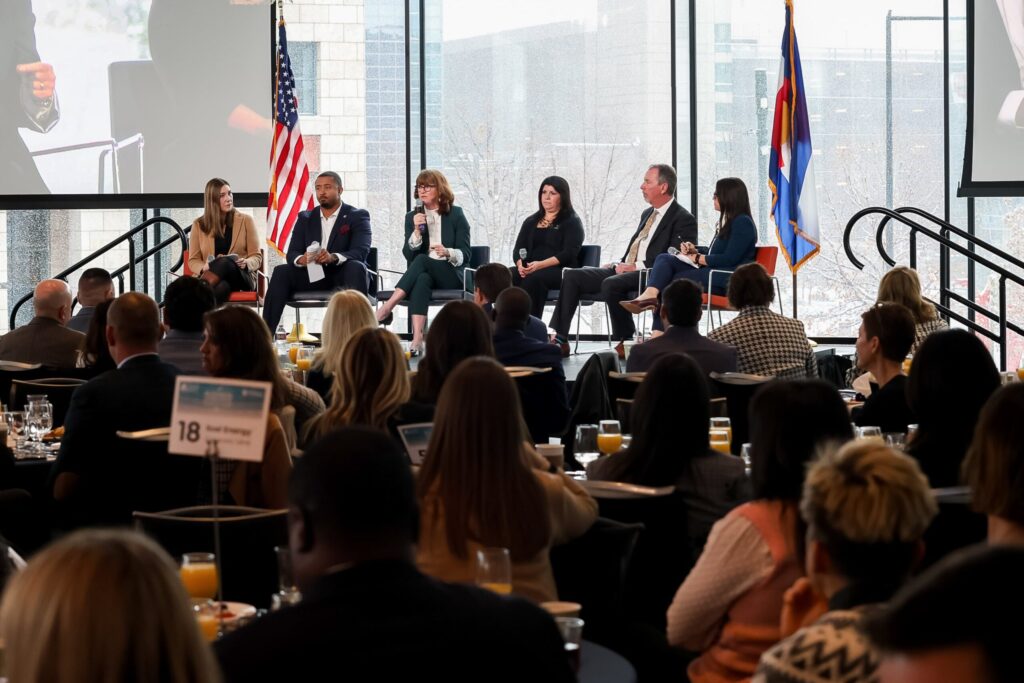Photo courtesy of Garrett Hackett at InSync Photography + Design
DENVER, CO, January 7, 2025—Colorado’s business community heard from leaders of the Colorado General Assembly about their plans, priorities and predictions for the 2025 legislative session at the Denver Metro Chamber of Commerce and Colorado Competitive Council’s (C3) Annual Business Legislative Preview—a neutral platform for both political parties to discuss what lies ahead for the business community. This year, the conversation centered around the Metro Denver Economic Development Corporation’s (EDC) Toward a More Competitive Colorado (TMCC) report, which explores the economic strengths and weaknesses of Colorado compared to competitor states and highlights the challenges facing small businesses that are integral to the state’s economic vitality.
Moderated by Chamber Vice President of Government Affairs Carly West and Vice President of Statewide Affairs/C3 Executive Director Rachel Beck, the panel featured Senate President James Coleman, Senate Minority Leader Paul Lundeen, Speaker of the House Julie McCluskie, and House Minority Leader Rose Pugliese.
When legislators were asked what they believe are the causes of Colorado’s decline in competitive rankings, there seemed to be bipartisan agreement on some of the state's biggest challenges, with Coleman and Lundeen both emphasizing Colorado’s regulatory environment, especially for businesses. “Regulation is necessary,” said Coleman, “but I think doing an assessment and evaluation of our regulations [is important, as well as] looking at ways that we can incentivize businesses to come here.”
“The way to get back up [in competitiveness] is for government to get out of the way of the value creators,” said Lundeen. “Let’s get rid of more regulations… Let’s get the legislature to go after some of the bigger stuff.”
Meanwhile McCluskie and Pugliese both honed in on Colorado’s rising costs and lack of affordability as leading causes for the state’s decline in economic competitiveness. “I want to emphasize an area of commonality for all of us, and that is affordability,” said McCluskie. “Our working class is feeling left behind.”
Pugliese also focused on affordability from the standpoint of excessive fees being placed on residents, such as the fee placed on plastic grocery store bags implemented in 2023. She stressed that it’s, “Not just rolling back regulations—which I’m completely for—but also rolling back these fees so people can… afford to live in Colorado.”
Another major topic of conversation was Colorado’s Labor Peace Act, and how a proposed bill for 2025 would eliminate the requirement for a second election to require all employees to pay union fees.
Responses were split down party lines, with Lundeen answering that he opposes any changes to the Labor Peace Act, stressing that when comparing the performance of the Labor Peace Act to states with alternative agreements, Colorado’s laws have proven best. “We have… outperformed even the other alternatives,” said Lundeen. “That gives us a good reason to think twice before we upend an 80-year act.”
Coleman and McCluskie both stated they wanted to collaborate to figure out what works best for Colorado’s business ecosystem. “In spirit, I want to see us come together,” said McCluskie. “Our business leaders, as well as our labor partners, to talk about this issue and negotiate around the table about what should come next for our great state.”
Coleman stated, “Our job is to find out what the best solution is for everybody in our state.”
Pugliese said she wanted to understand the issue more before committing a stance.
Denver Metro Chamber President and CEO J. J. Ament provided closing remarks that hammered the importance of maintaining Colorado’s Labor Peace Act.
“Protecting the Labor Peace Act is essential for Colorado’s economic future,” said Ament. “No private sector membership organization… should be able to take money from your or my paycheck without our express permission.” He also stressed this should not be a matter of partisanship, stating, “No bill… should ever be introduced as somehow a test of loyalty or allegiance to a political party.”
The Denver Metro Chamber took an official stance on maintaining the Labor Peace Act in November 2024.
Stay up to date with the Chamber’s stances this session and view the full TMCC report for more information on Colorado’s economic standing.
About the Denver Metro Chamber of Commerce
For nearly 160 years, the Denver Metro Chamber of Commerce (DMCC) has been a pivotal force in advancing Colorado’s business landscape. Engaging a diverse membership throughout the Metro Denver region, the Chamber advocates for businesses of all sizes through its network, which includes the Metro Denver Economic Development Corporation, the Denver Metro Chamber Leadership Foundation, B: CIVIC, and the Colorado Competitive Council.
The DMCC’s vision is Economic Empowerment for Every Coloradan and is achieved by advocating for effective public policy, developing civic leaders, and driving a sustainable economy. We promote a vibrant economy by fostering a business-friendly environment, supporting a skilled workforce and facilitating connections. Dedicated to boosting business and employee opportunities, the Chamber drives sustainable growth and prosperity across Colorado.





